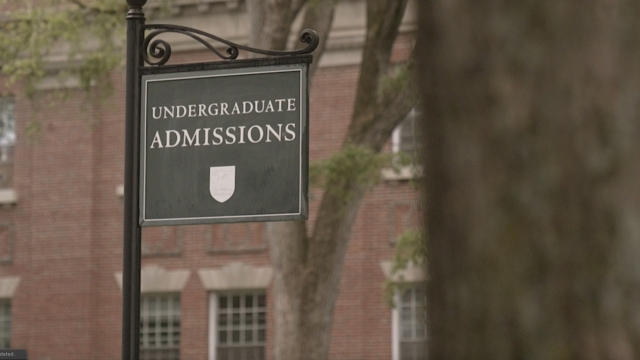It can be one of the most impactful moments of your life, but you don't get to see for yourself when your college application makes it to the desk of an admissions officer and they decide on whether you get in.
As a former college admissions officer, Michele Hernandez knows what works on a college application.
"Focus on one thing and go in-depth. That's the best hack I can say is be really amazing at something no matter what that something is," she told Scripps News.
Hernandez was a gatekeeper to one of the most selective schools in the country, Dartmouth, which lets just 6% of applicants in. And she admits to being part of a system that's flawed.
"Sometimes it's subconscious, like 'oh that letter, it seems lukewarm,' but maybe that person didn't know how to write a recommendation letter and the student was great," she said. "So there are a lot of talented kids that they miss."
SEE MORE: Should students gain college admissions due to legacy family names?
As America reacts to the Supreme Court's decision to ban affirmative action, Hernandez says it's important to recognize the other "hooks" that are valued just as much by elite colleges, that don't directly have to do with grades or test scores.
"The orchestra is going to need a certain number of musicians. The dance department is going to need a certain number of dancers," Hernandez said. "So they're always looking for different things."
For years, Hernandez has spoken and written about the spots many schools reserve for students to fill certain criteria. She says, in her experience, roughly 10% to 12% of spots in a class could be reserved for students of color. But anywhere from 10% to 15% could be saved for students whose parents were alumni, known as legacies. An even larger group of 17% to 20% are saved for students recruited to play sports.
Hernandez says those other "hooks," beyond race, are often not filled with minority students.
"Going to an Ivy League school sets you on a better path," she said. "We know it's an advantage. But why is that advantage only reserved for wealthy White kids?"
The U.S. Department of Education is currently investigating Harvard's acceptance of legacy students, looking at whether it violates the Federal Civil Rights Act.
SEE MORE: Jaded with education, more Americans are skipping college
Two prestigious liberal arts colleges, Wesleyan in Connecticut and Occidental in California, announced they will no longer consider legacy students when looking at whether to accept their application.
"I think the quick way to make it fairer is to get rid of legacy admissions, pay attention to income, and really make a commitment to giving full financial aid," Hernandez said.
Along with doing more to evaluate a student's socio-economic background, Hernandez believes prestigious schools need to change their recruiting tactics when it comes to diversity.
"As an admissions officer, I visited high schools," she added. "The whole fall is [spent] visiting high schools. I visited a lot of high schools and prep schools. You could visit a lot more inner city schools and tell these kids, 'Hey, you do have a chance to get in, here's what they're looking for and what you need to do,'" Hernandez says.
Today, Hernandez runs the college prep-company Top Tier Admissions, which tutors students to get on the right track to one day apply to the kind of institution she once worked at, offering insight that parents are willing to pay tens of thousands of dollars for.
"Not everyone deserves to go to the hardest school in the country to get into," she said. "But they deserve to go to college, and we can at least make it more equitable and try to open the doors to get there. That's kind of the American dream in a nutshell."
Trending stories at Scrippsnews.com




